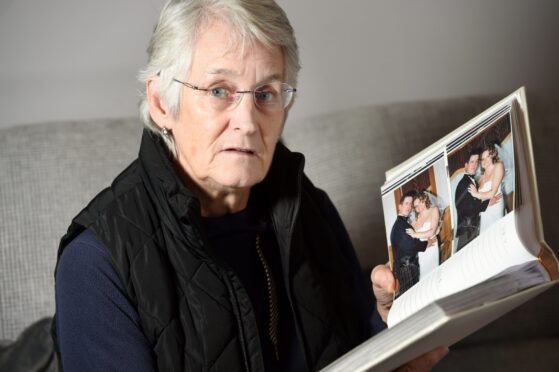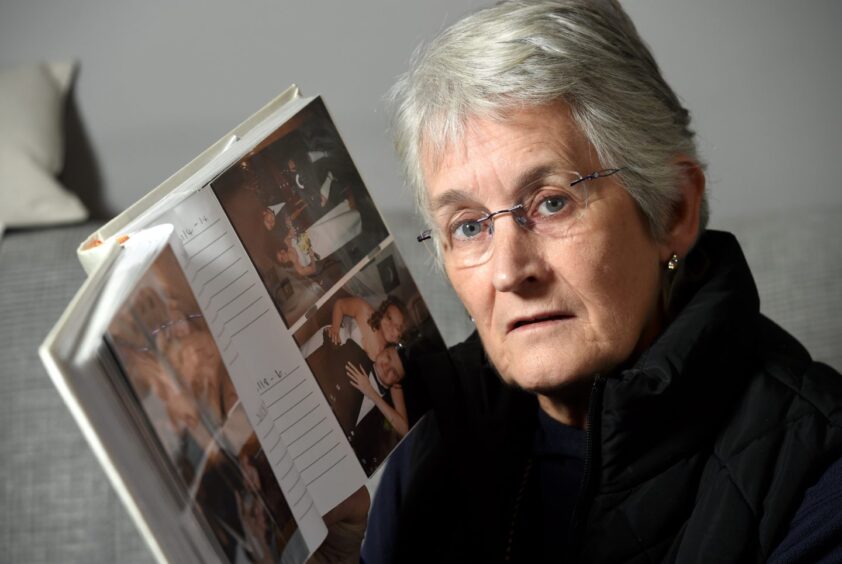If she hadn’t found a place to talk about her son, Frances Quinn isn’t sure she would still be here.
It’s been six and a half years since Scott Quinn died, leaving behind his wife and three young children.
Without a clear explanation about why he decided to end his own life, his mum was left to exhaust every scenario in her head.
It led her down a dark path.
And one that could have had a very different ending if she hadn’t decided to get help herself.
“I don’t know how I’ve survived,” said Frances. “There’s been times I’ve been so low I didn’t want to be here either.”
Scott’s adventurous life
Scott Quinn lived a very well-travelled life.
After growing up in the Highland village of Maryburgh, he attended Dingwall Academy and was the envy of his friends when he moved south to London.
A spell working in Dublin followed, where he met his future wife Cathy.
By the age of 23, he was married and living in Nova Scotia – where Cathy was from.
They had three children – Joanna, Callum and Lauchlan – and moved to a big house south of Halifax, the largest city in Canada’s maritime provinces.
His career as a steel fixer was progressing well and he’d recently become a foreman.
On the face of it, everything seemed to be going well.
But privately, Scott was making plans for his death.
And on March 27, 2017 he made his final decision and everything changed.
He was 37 years old.
Home, work and family pressure
Frances and Scott’s younger brother Grant were regular visitors to his home in Canada.
The 68-year-old doted on her grandchildren and was in her happy place in their company.
It didn’t seem obvious at the time, but reflecting back now there were little signs that all was not well with Scott.
His promotion to a new job as a foreman broke up a professional partnership with a previous boss who’d become like family to him.
Scott’s new charges weren’t up to scratch and it meant he was taking on a lot of extra work.
At home, the big house and mortgage he’d tied himself to was proving stressful as numerous maintenance issues required immediate attention – and money.
Having three children under 10 brought a whole new set of responsibilities and pressures.
And the death of his father-in-law in January 2017 also hit hard.
Frances said: “One time in February, the month before he died, I was talking to Scott on the phone and I got really worried and upset.
“He was saying he thought he was letting people down, that he wasn’t good enough.
“Scott just felt with everything, he wasn’t coping very well. We both got upset but I thought it was about his work, he was working on a big project at the time.
“I just said ‘look Scott, take your time, it will get done’.
Scott’s death has left his family wondering
Geography added an even more complicated element to the grief and shock of losing Scott.
From having the news broken to her by daughter Emma on a Monday night, it wasn’t until Saturday that Frances was able to reach Nova Scotia via a long trip with many stopovers.
She learned that Scott had been signed off work with stress several months before his death.
But there are precious few other details that have helped explain why in the years that have passed.
“I still have loads of unanswered questions,” said Frances. “I can’t get my head around it. He must have been so troubled.”
Unfortunately, Frances is no stranger to grief.
Her brother Willie died in a motorcycle accident at the age of 19 in 1976. It was the same year Frances was due to be married and he was going to give her away.
Her youngest brother John took his own life aged 34 in 2001.
And her husband Hamish, Scott’s dad, died of a heart condition in 2004.
Those heartbreaks have made it difficult to get through the day, at times.
Frances said: “After Scott’s death, I didn’t function very well for a long time.
“I don’t even know if I do now. But I know I’ve still got Grant, Emma and my grandchildren and I have to keep it together.”
A strategy for surviving
Help was hard to come by in the weeks and months that followed.
But a friend told Frances about a group called Sobs, survivors of bereavement of suicide, that held meetings in Elgin.
It gave her a lift and not long after, she started attending meetings held by the James Support Group.
The charity was formed by Patrick and Wendy Mullery after their son James, a father-of-three from the Black Isle, took his own life.
“Those meetings have been life-saving,” Frances said.
“There are people there who know exactly what you’re going through. And it’s not just for family members, it helps people who have suicidal thoughts too.
“They’re there, seeing what happens to the family left behind.”
How to get help
It is so important that if you are having thoughts of suicide, you reach out to someone.
And by starting a conversation with someone who is struggling, you could save a life and put them on a path to recovery.
The James Support Group can be reached 24 hours a day, seven days a week on 07563 572 471.
You can also reach out to the group on Facebook or by email.
There are also a number of other local and national groups offering support in times of crisis or mental distress.
- Mikeysline – 07786 207755 (Sunday to Thursday 6pm – 10pm, Friday to Saturday 7pm – 7am)
- Samaritans – 116 123 (calls are free and do not show on a phone bill)
- Breathing Space – 0800 83 85 87 (Monday to Thursday 6pm – 2am; Friday 6pm to Monday 6am)
If you are concerned about someone else don’t be afraid to ask, “are you OK?” and help them to get help.
This story is the second of a three-part series on suicide prevention in the Highlands.
Its goal is to shine a light on the issue and to provide a message of hope to people who are struggling themselves.





Conversation